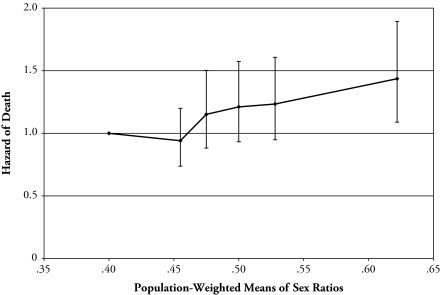
Preliminary Evidence Regarding the Hypothesis that the Sex Ratio at Sexual Maturity May Affect Longevity in Men
Abstract
In human populations, variation in mate availability has been linked to various biological and social outcomes, but the possible effect of mate availability on health or survival has not been studied. Unbalanced sex ratios are a concern in many parts of the world, and their implications for the health and survival of the constituent individuals warrant careful investigation. We indexed mate availability with contextual sex ratios and investigated the hypothesis that the sex ratio at sexual maturity might be associated with long-term survival for men. Using two unique data sets of 7,683,462 and 4,183 men who were followed for more than 50 years, we found that men who reached their sexual maturity in an environment with higher sex ratios (i.e., higher proportions of reproductively ready men) appeared to suffer higher long-term mortality risks than those in an environment with lower sex ratios. Mate availability at sexual maturity may be linked via several biological and social mechanisms to long-term survival in men.
Citation:
L. Jin, F. Elwert, J. Freese, and N.A. Christakis, "Preliminary Evidence Regarding the Hypothesis that the Sex Ratio at Sexual Maturity May Affect Longevity in Men" Demography, 47(3): 579- 586 (August 2010)